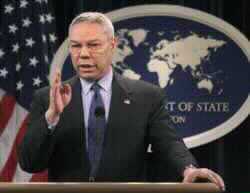U.S. Ends Diplomacy; Bush to Deliver Ultimatum
18/03/2003| IslamWeb
 The United States and its allies on Monday abandoned diplomacy and prepared to deliver a final ultimatum to Iraqi President Saddam Hussein to go into exile or face a massive military onslaught. As Washington cut short diplomatic efforts to win U.N. authorization for the use of force against Iraq, U.N. weapons inspectors and other foreigners scrambled to evacuate Baghdad ahead of a U.S. aerial bombardment, followed by a ground invasion to kill or capture Saddam and dismantle his government.
The United States and its allies on Monday abandoned diplomacy and prepared to deliver a final ultimatum to Iraqi President Saddam Hussein to go into exile or face a massive military onslaught. As Washington cut short diplomatic efforts to win U.N. authorization for the use of force against Iraq, U.N. weapons inspectors and other foreigners scrambled to evacuate Baghdad ahead of a U.S. aerial bombardment, followed by a ground invasion to kill or capture Saddam and dismantle his government.
Saddam rejected suggestions he flee the country to save it from war, with Iraq's foreign minister saying "any child" in Iraq knew that President Bush's ultimatum was a nonstarter.
The United States and Britain have 280,000 troops poised to attack and are expected to quickly overwhelm Iraqi defenses.
But they could still face severe challenges if the Iraqis use chemical weapons or decide to defend Baghdad street by street.
Bush scheduled an address to the American people on Monday evening to explain why he thought war was necessary unless Saddam left Iraq immediately.
"He will say that to avoid military conflict, Saddam Hussein must leave the country," said White House spokesman Ari Fleischer. "The next move will be up to Saddam Hussein."
Secretary of State Colin Powell said the time for diplomacy had passed.
"I can think of nothing that Saddam Hussein could do diplomatically. That time is now over. He has had his chance. He's had many chances over the last 12 years and he's blown every one of those chances," he said.
Still, Bush, who is betting his presidency on the war, was expected to give Saddam a brief window, perhaps 48 or 72 hours, to depart before the shooting started.
Iraq's Foreign Minister, Naji Sabri, quickly dismissed that idea. "The only option (to secure peace) is the departure of the warmonger number one in the world, the failing President Bush who made his country a joke," Sabri said.
The attack could begin within hours of the U.N. inspectors leaving Iraq, which they were expected to do on Tuesday.
British Ambassador Sir Jeremy Greenstock announced at the United Nations a U.S.-British-Spanish resolution authorizing war would not be put to a vote.
A short time later U.N. Secretary General Kofi Annan announced the withdrawal of U.N. staff from Iraq. "We seem to be at the end of the road here. Obviously it's a disappointment and a sad day for everybody. War is always a catastrophe," Annan said.
The United States and Britain blamed France, which threatened a veto against the resolution, for its defeat. But France's U.N. ambassador, Jean-Marc de la Sabliere, said the real reason was that "the majority of the council confirmed they do not want to authorize the use of force."
He also proposed a foreign ministers meeting on Wednesday on the Iraqi crisis when chief U.N. inspector Hans Blix is due to give another report.
A CNN/USA Today/Gallup poll released on Monday found 50 percent of Americans opposed to war if the United States attacked Iraq without a new vote, while 47 percent approved.
PHOTO CAPTION
U.S. Secretary of State Colin Powell speaks at the State Department in Washington, March 17, 2003. Powell said the 'time for diplomacy has passed' for Iraq (news - web sites) and he could think of nothing that Iraqi President Saddam Hussein (news - web sites) could do diplomatically to stay in power. REUTERS/Brendan McDermid - Mar 17 12:32 PM ET
www.islamweb.net
